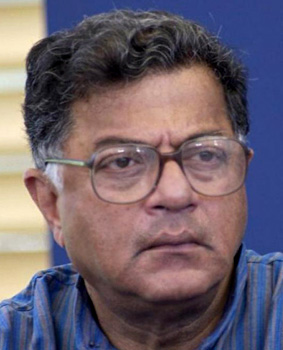 Influence of philosophy on Modern Indian Literature needs to be examined from different dimensions. One aspect, that of Sanatana Bhakti has been amply explored by an Indian writer by Girish Raghunath Karnad. In a recent play Taladanda, Girish Karnad fictionalizes a historical twelfth century poet-community in Kalyan, which he labels "founders of Kannada literature," whose "philosophy and devotion" fired social reform. These "Sharanas" decided to challenge the caste system with the marriage of a Brahmin girl to an untouchable. In the holocaust that followed, the couple`s parents were blinded, the Sharanas were slaughtered, and the movement went underground for several centuries and emerged, ironically, as the caste-ridden Lingayats. Karnad`s own rendition of this narrative draws parallels between the event and contemporary slaughter in India in the name of religion and caste. It presents a very culturally specific problem for those cultural analysts of India who attempt to make connections between a usable past and contemporary realities. This problem is summarized by Karnad later in the piece- that between sanatana (fundamentalist-dogmatic tradition) and bhakti (radical-liberal). Both of these predate the epistemic interference of European colonialism but take new forms as a result of imperially constructed communalisms and casteisms.
Influence of philosophy on Modern Indian Literature needs to be examined from different dimensions. One aspect, that of Sanatana Bhakti has been amply explored by an Indian writer by Girish Raghunath Karnad. In a recent play Taladanda, Girish Karnad fictionalizes a historical twelfth century poet-community in Kalyan, which he labels "founders of Kannada literature," whose "philosophy and devotion" fired social reform. These "Sharanas" decided to challenge the caste system with the marriage of a Brahmin girl to an untouchable. In the holocaust that followed, the couple`s parents were blinded, the Sharanas were slaughtered, and the movement went underground for several centuries and emerged, ironically, as the caste-ridden Lingayats. Karnad`s own rendition of this narrative draws parallels between the event and contemporary slaughter in India in the name of religion and caste. It presents a very culturally specific problem for those cultural analysts of India who attempt to make connections between a usable past and contemporary realities. This problem is summarized by Karnad later in the piece- that between sanatana (fundamentalist-dogmatic tradition) and bhakti (radical-liberal). Both of these predate the epistemic interference of European colonialism but take new forms as a result of imperially constructed communalisms and casteisms.
The narrative illustrates the conflicts and transitional orthodoxies of the past that defeat attempts to recover a pristine history advocated by the proponents of Hindutva, and the connection of literature to violence underlines its potentially radical role. Karnad`s always creative use of history and fiction and their inter-penetration is a salutary attempt to reinterpret cultural motifs deriving from both Hindu and Muslim traditions.
Along with Sanatana Bhakti, pravritti-nivritti (renunciation-worldliness) is considered another philosophical paradigm within which to place "Indian" cultural production. This latter is Louis Dumont`s formulation "ascetic versus man relegated to an intimate realm."
However, studies that discredit the old models carry their own traps. Vijay Mishra`s characterizing of Indian society as de-centered at the level of deep structure, while usefully challenging the Dumontian model, nevertheless represents Indian culture in terms recognizable to a de-constructivist readership.
This article is a stub. You can enrich by adding more information to it. Send your Write Up to content@indianetzone.com



















